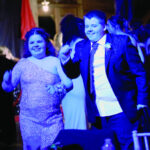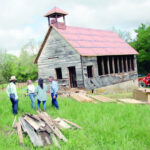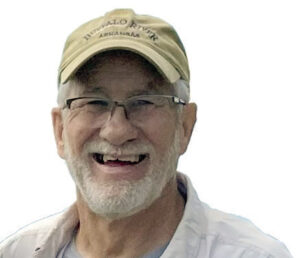On September 19, 1796, the president’s farewell address appeared in Philadelphia’s Claypoole’s American Daily Advertiser.
The address, written by George Washington with the aid of Alexander Hamilton, contained many important themes. Washington reminded the country of her Revolutionary principles, tried to ease geographic tension, stressed the importance of religion and morality, gave financial advice, and inaugurated a presidential foreign policy that would influence American politics for the next century— stretching even to the present day.
“The great rule of conduct for us, in regard to foreign Nations,” the first president wrote, is “to have with them as little political connection as possible.” Because America enjoyed a natural barrier—the Atlantic Ocean—Washington argued that it would be “unwise in us to implicate ourselves, by artificial ties, in the ordinary vicissitudes of [foreign] politics, or the ordinary combinations & collisions of her friends, or enmities.”
Washington’s words were timely and pragmatic. The French Revolution was descending into chaos, and Americans were divided on whether the country should support or remain neutral in a conflict that included England. Ultimately, Washington declared neutrality, proclaiming America “friendly and impartial toward the belligerent powers.” Practically, America was in no position to go to war; it would have been catastrophic for the young, financially, and militarily vulnerable country. Washington’s policy of neutrality, or isolation, kept America free from the devastation of the Napoleonic Wars.
Washington’s successors continued this policy of neutrality and political isolation. After all, Europe and her troubles lay an ocean away—an ocean that took months to traverse in wooden ships. In 1801, Thomas Jefferson praised Washington’s policy as a doctrine of “peace, commerce, and honest friendship with all nations, entangling alliances with none.” Others would do the same. But times would change, and so would American foreign policy.
On July 16, 1945, 149 years after Washington’s address, the U.S. government successfully denoted the world’s first nuclear weapon, codenamed “Trinity,” in the Jornada del Muerto desert in New Mexico. Less than a month later, on August 6, President Harry Truman authorized the detonation of the bomb over Japan, who refused to surrender the Second World War. The first bomb landed on Hiroshima and killed 80,000 people instantly with the force of 20,000 tons of TNT—tens of thousands more died from the radiation. The second bomb produced hauntingly similar results.
Ultimately, the Second World War claimed tens of millions of lives. Further, it came shortly after the devastation of the Great War, itself costing tens of millions of lives. The world and the nature of war had changed since Washington; the death toll at Hiroshima alone was more than triple the number of American deaths during the eightyear Revolutionary War.
The terrible experience of war in the twentieth century taught Harry Truman—and the world—valuable but costly lessons. On April 4, 1949, standing in the Departmental Auditorium in Washington, D.C., Truman spoke at the historic signing of the North Atlantic Treaty. “The purpose of this meeting,” Truman began, “is to take the first step toward putting into effect an international agreement to safeguard the peace and prosperity of this community of nations.” The president explained the treaty: “This treaty is a simple document. The nations which sign it agree to abide by the peaceful principles of the United Nations, to maintain friendly relations and economic cooperation with one another, to consult together whenever the territory or independence of any of them is threatened, and to come to the aid of any one of them who may be attacked.”
Truman praised the “formal association” of democratic countries as a leap, not so much a step, toward “their mutual self-protection.” Had such a treaty existed between 1914 and 1939, Truman argued, “it would have prevented the acts of aggression which led to two world wars.” Truman saw NATO as a grand attempt to shield the Atlantic community— even the entire world— from “the tragedy of those two wars” that nearly destroyed freedom and democracy worldwide. “Twice in recent years, nations have felt the sickening blow of unprovoked aggression,” Truman said. “We are determined that they shall not happen again.”
Speaking to the Senate a week later, Truman asked for ratification so the world could be free from global war. “The oceans to our east and west no longer protect us from the reach of brutality and aggression,” he said. “The security and welfare of each member of the community depend upon the security and welfare of all. None of us alone can achieve economic prosperity or military security. None of us alone can assure the continuance of freedom.”
Technology and globalization had created too closely knit a world to choose alienation. Alliances, Truman argued, are the only way to achieve peace in the modern, connected world, for they draw a line in the sand and outline clear consequences for aggressive actions. “The world is very different down,” President Kennedy said in 1961, “For man holds in his mortal hands the power to abolish…all forms of human life.”
In June 1963, just months before his tragic assassination, Kennedy, speaking on the Cold War, said that “total war makes no sense in an age” that is so connected. Echoing Truman’s logic, he said, “We all breathe the same air. We all cherish our children’s futures. And we are all mortal”; global war is unnecessary and assures only “mutual destruction.”
Whether “the world be made fit and safe to live in” under the shield of “a just and stable peace,” Woodrow Wilson said in 1918, depends on the willingness of nations to choose the open hand rather than the fist.
“No single action, no matter how significant, will achieve peace,” Truman said. “We must continue to work patiently and carefully, advancing with practical, realistic steps in the light of circumstances and events as they occur, building the structure of peace soundly and solidly.”
Dakoda Pettigrew is a senior political science and history undergraduate student whose father went to school in Cassville. He lives in Tennessee and can be reached at pettigrewdakoda6@gmail.com.







